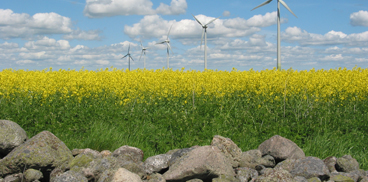The Region of Sardinia's energy strategy

Access to energy sources determines the structure of each country's energy system and has a strong impact on its economic, production and social development. Energy sources can be grouped into two large categories: non-renewable energy sources, which include fossil fuels (coal, oil, natural gas) and nuclear fuels, and renewable energy sources, such as sun, wind, geothermal resources, water and biomass. No energy source is ideal in every respect, each has specific benefits and drawbacks.
Today, fossil fuels meet about 80% of world primary energy demand and, according to the forecasts of the International Energy Agency (World Energy Outlook 2006), their share is likely to remain largely unchanged in the coming decades. However, massive recourse to fossil fuels on the one hand is driving up prices and on the other is increasing greenhouse gas concentration in the atmosphere, a phenomenon considered one of the major causes of global warming. For these reasons, it is crucial to diversify the energy mix, boosting the role of renewables and more efficient use of energy, based on energy saving and energy efficiency criteria.
Italy, similarly to other EU regions, has a very vulnerable energy system, due to scarcity of domestic fossil fuels and heavy dependency on oil and gas imports. This causes a lack of supply security and high fluctuations in the price of electricity and fuels for end-users.
In order to improve the competitiveness of the Italian energy system, in recent years the government has launched strong incentive schemes for encouraging the use of renewable energy sources, and, in the longer term, the possibility of returning to nuclear power generation.
At regional level, Sardinia has adopted its own Energy plan, which includes the following main objectives: ensure grid stability and energy security through the strengthening of energy infrastructure, upgrade the energy system to match the requirements of the regional production system, diversify the energy mix to ensure efficient supply, decrease reliance on oil products, ensure compatibility of power production and distribution with environmental protection requirements and harmonise the structure of energy grids.
In order to foster R&D in the field of RES and to muster local know-how in development and generation of renewable energy into an integrated system, the Regional Government has funded the creation of a RES cluster. The cluster represents a major step forward in the regional strategy for research development and an instrument supporting the regional Environmental energy plan in implementation of the programmes aimed at reducing harmful emissions.
Today, fossil fuels meet about 80% of world primary energy demand and, according to the forecasts of the International Energy Agency (World Energy Outlook 2006), their share is likely to remain largely unchanged in the coming decades. However, massive recourse to fossil fuels on the one hand is driving up prices and on the other is increasing greenhouse gas concentration in the atmosphere, a phenomenon considered one of the major causes of global warming. For these reasons, it is crucial to diversify the energy mix, boosting the role of renewables and more efficient use of energy, based on energy saving and energy efficiency criteria.
Italy, similarly to other EU regions, has a very vulnerable energy system, due to scarcity of domestic fossil fuels and heavy dependency on oil and gas imports. This causes a lack of supply security and high fluctuations in the price of electricity and fuels for end-users.
In order to improve the competitiveness of the Italian energy system, in recent years the government has launched strong incentive schemes for encouraging the use of renewable energy sources, and, in the longer term, the possibility of returning to nuclear power generation.
At regional level, Sardinia has adopted its own Energy plan, which includes the following main objectives: ensure grid stability and energy security through the strengthening of energy infrastructure, upgrade the energy system to match the requirements of the regional production system, diversify the energy mix to ensure efficient supply, decrease reliance on oil products, ensure compatibility of power production and distribution with environmental protection requirements and harmonise the structure of energy grids.
In order to foster R&D in the field of RES and to muster local know-how in development and generation of renewable energy into an integrated system, the Regional Government has funded the creation of a RES cluster. The cluster represents a major step forward in the regional strategy for research development and an instrument supporting the regional Environmental energy plan in implementation of the programmes aimed at reducing harmful emissions.








